
Project title: Innovative two-dimensional nanomaterials for photo-thermal therapy of melanoma
Project contract number: 1232462
Project implementation deadline: 18.05.2023. - 17.05.2025.
Total project funding: 162 499,20 EUR
Research manager: (Dr.) Volodymyr Deineka, e-pasts:volodymyr.deineka@lu.lv
About the project: The “Innovative two-dimensional nanomaterials for photo-thermal therapy (PTT) of melanoma” project scope is developing a new effective anticancer treatment strategy based on the targeted PTT effect using MXene nanosheets.
Project tasks: Using novel technologies, we are looking to develop a concept of targeting therapy of malignant tumours with minimal side effects. The project will be implemented with the close cooperation of Prof. Maksym Pogorelov - expert in biomaterials (LU), Prof. Una Riekstiņa – expert in pharmacology and cell biology, Prof. Yuriy Gogotsi - Director of A.J. Drexel Nanomaterials Institute, who discovered a novel class of 2D materials – MXenes, and the world leader in the production of MXenes - Carbone Ukraine (CEO- Alex Gogotsi).
The tasks of the project are to prepare conference theses and 3 scientific publications.

Dr V. Deineka presents first year results of the project at the weekly IAPS Scientific Seminar
At the scientific seminar of the Institute of Atomic Physics and Spectroscopy on January 4, 2024, Dr. Volodymyr Deineka presented the results of the MSCA4Ukraine project "Innovative two-dimensional nanomaterials for photo-thermal therapy of melanoma" achieved in the first 7 months of the project. existing versions of MXenes that can be used in biomedical research were demonstrated. It is presented that 2D titanium carbide nanosheets are best suited for photothermal therapy with an infrared laser with a wavelength of 808 nm as a photosensitizer. The most essential ISO standards for the study of biomaterials are described. It describes what methods and cellular technologies were used to assess the toxicity and biocompatibility of these nanomaterials. Cooperation is presented with laboratories within the University of Latvia and international collaboration (published 05.02.2024.).



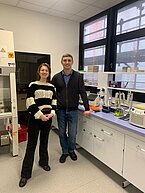
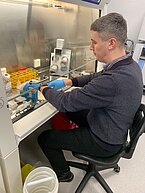
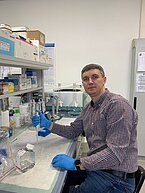
Dr. Volodimir Deineka 2024.gada 5.februārī - 4.martā atradās apmaiņas braucienā Esenes Universitātes klīnikā (Universitaetsklinikum Essen)
Apmaiņas brauciena laikā pie padziļināta pētījuma par anti-CEACAM1 antivielu koncentrācijas optimizēšanu MXene-polidopamīna-antivielu kompleksa veidošanai. Tika strādāts pie sistemātisku kompleksa afinitātes pārbaudi pret CEACAM1 pozitīvām šūnām. Pētniecības iniciatīva tika paplašināta un tajā tika pētītas MXene imūnās īpašības. Tika pārbaudīta ietekme uz citokīnu, tostarp IL-6, IL-8 un IL-10, sekrēciju. Kas sniedza jaunu ieskatu MXene imūnmodulējošajās īpašībās, kas sniedza paplašinātu ieskatu iespējā izmantošanā pētniecībā ar zāļu piegādi un citās biomedicīnas jomās.
Esot Essenē, V. Deineka piedalījās katedras iknedēļas zinātniskajos semināros, kas nodrošināja platformu, lai iepazīstinātu ar pētījumu rezultātiem, iesaistītos kritiskās diskusijās un plānotu turpmākos pētījumus.
Vizīte tika veikta Horizon Europe MSCA-SE projekta ‘Towards MXenes' biomedical applications by high-dimensional immune MAPping’ (MX-MAP) ietvaros sinerģijā ar MSCA4Ukraine projekta ‘Inovatīvie divdimensiju nanomateriāli melanomas fototermiskajai terapijai’ (Innovative two-dimensional nanomaterials for photo-thermal therapy of melanoma) Nr. 1232462, sadarbības rezultāti būs daļa no turpmākā pētījuma raksta par mērķtiecīgu melanomas šūnu fototermālo terapiju
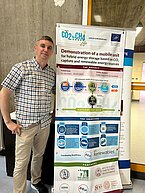
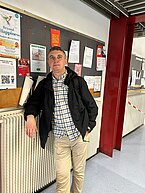

Dr. Volodimir Deineka 2024.gada 16.maijā - 25.jūnijā bija apmaiņas braucienā Padujas Universitātē (Universita Degli Studi Di Padova - UNIPD), Padovā, Itālijā
Šī brauciena laikā tika izpētīt Nb2C un V2C MXenes bioloģiskā saderība un imūnreakcija. Šie MXene biosaderības dati tika salīdzināti ar limfocītu un monocītu reakciju eksperimentālajā in vitro. Tika novērtēta imūnās atbildes reakcijas atkarība no aukstum aģenta un MXene datu koncentrācijas. Notika intensīva apmācība sekrēciju un darbu ar imūnšūnām, kas iegūtas no cilvēka perifērijām asinīm. Padujas Universitātes zinātnieki demonstrēja viņu nanomateriālu imūno īpašību izpēti.
Pēc biosaderības un imunogenitātes rezultātu iegūšanas dati tika apspriesti, lai spētu atlasīt labākos paraugus, kurus izmantotu MXene-Polydopamine-Aantivielu kompleksus. Dr Deineka apmaiņas laikā demonstrēja fotokonversijas rezultātus pēc lāzera starojuma uz nanodaļiņām. Diskusijas palīdzēja izvēlēties optimālo koncentrāciju, lai samazinātu šūnu bojājumus, bet saglabātu efektīvu fototermisko konversiju. Pētījumu rezultāti tiks izmantoti turpmākajos eksperimentālajos pētījumos in vitro, modificējot apstarošanas režīmus.
Apmaiņas brauciens tika veikts Horizon Europe MSCA-SE projekta ‘Towards MXenes' biomedical applications by high-dimensional immune MAPping (MX-MAP)’ ietvaros sinerģijā ar MSCA4Ukraine projekta ‘Inovatīvie divdimensiju nanomateriāli melanomas fototermiskajai terapijai’ (Innovative two-dimensional nanomaterials for photo-thermal therapy of melanoma) Nr. 1232462.

 CONFERENCE
CONFERENCE